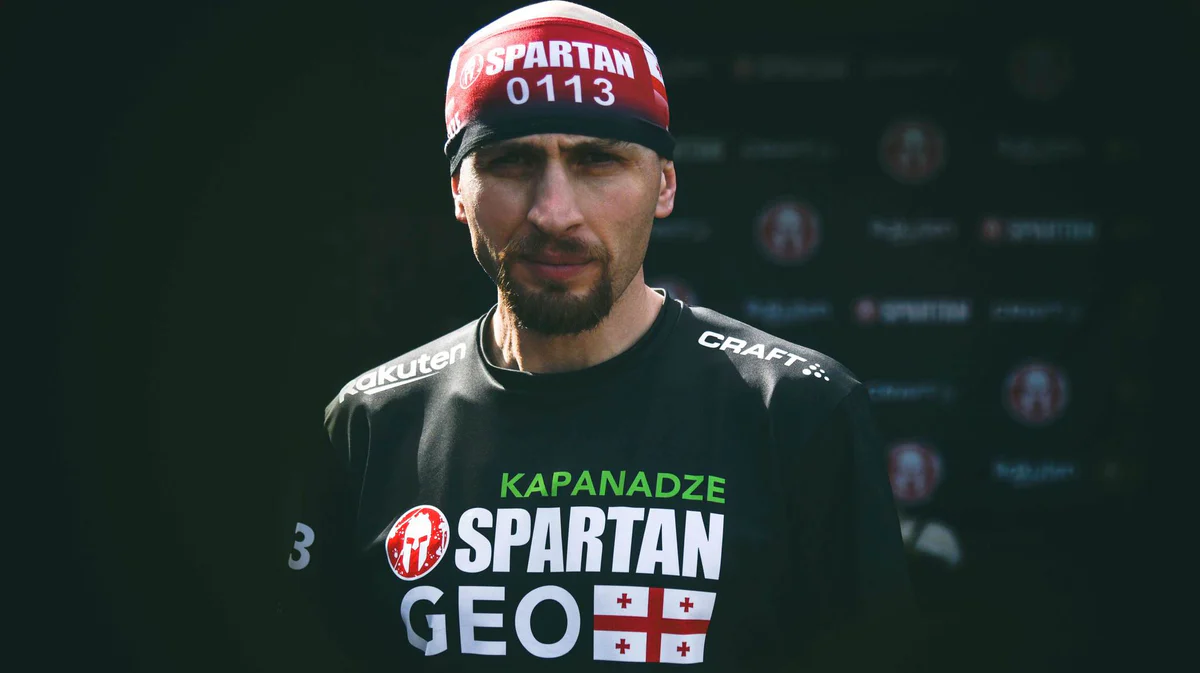Eat Like Sepsis Survivor and Spartan Pro Lefty Kapanadze for a Week

Everybody wants to know how the highest-level athletes fuel their bodies for elite competition. What are their go-to foods? Which diets do they rely on for max performance? How do they strategically break up their day? In Eat Like a Champion, a recurring franchise, we give you the inside scoop on our professional athletes' dietary habits: what they're eating, why they're eating it, and when they're eating it. Follow their lead and fuel like a champion.
Lefty Kapanadze is about as Spartan as one can get.
Born in Tiblisa, the capital of the Republic of Georgia, Kapanadze — an Elite Spartan racer with a flair for Ultra events — always loved sports, despite battling chronic bronchitis, multiple bouts of pneumonia, and sepsis (a potentially life-threatening inflammatory reaction to infection).
Then there were the hardships of war, as Georgia fought for independence from a crumbling Soviet Union. The Ultra athlete describes the situation vividly on his website, where he refers to himself as "Spartan Lefty":
“I remember seeing tanks and armed troops on our streets, devastation, suffering, and even death,” he says.
Surviving War and Hard Times
The weather in Tiblisa ranges from hot, humid summers to frigid winters. During the war, there was no heat or electricity. Food was scarce and his family survived on soy, beans, and buckwheat.

“We had to stay in line in front of the store all night long just to buy one loaf of bread in the morning,” Kapanadze says.
There’s the popular quote from Nietzsche’s book, Twilight of the Idols: “That which does not kill me makes me stronger.” Throughout his entire life, Kapanadze has lived the Nietzsche ethos. He turned the hard times of his childhood into determination, hard work, and discipline that has enabled a prolific career in OCR.
An Unstoppable Love of Sports
Kapanadze initially played baseball for the Georgia National Team, and ultimately made the minor leagues in the United States. But when an elbow injury sidelined him from the sport, he took to downhill mountain biking.
Then, a crash damaged his sciatic nerve and the doctors told him he’d never run again, he worked his way back to health on his own and — thanks to his wife secretly signing him up for an event — took up Spartan racing.
Related: Don't Be Dumb. Deal With Your Injuries BEFORE Your Race.
It was a good fit. In a period of three years, Kapanadze raced in more than 100 Elite events, securing a complete spectrum of podium finishes along the way: Stadion, Sprint, Super, Beast, and Ultra.
Powered by Clean Fuel
These days, Kapanadze’s nutrition is integral to his dedication, but that wasn’t always the case.

“I changed my diet when I was 25 years old,” he says. “I used to eat a lot, though I was never overweight because I trained vigorously every day. The only problem was that my athletic performance was not optimal.”
Related: 5 Reasons That People Overeat, and How to Combat Each One
The key change: “I cut out all of the junk food and ate only clean carbs instead; mostly carbs from whole foods.”
The new awareness was a hindsight. Kapanadze realized that his performance had been suboptimal when his dietary upgrade was swiftly followed by performance gains.
Pre-Race Disciplines
In addition to eating a consistently clean diet, Kapanadze is particularly disciplined in the days leading up to a race. He avoids things like seafood and carbonated drinks to ensure that his stomach will work for him and not against him.
“A few days before the race, I pay close attention to exactly what and how much I eat," he says. "We know that seafood products can have a higher risk of getting foodborne illnesses. Shellfish also carries the risk of food poisoning because the algae that the shellfish live in produces many toxins that can build up to dangerous levels.”
Related: What to Eat the Week Before a Spartan Race
This awareness was charged with life experience. A few years back, Kapanadze ate cooked clams and suffered through a neurotoxic shellfish poisoning.
“I stopped eating shellfish altogether,” he says. “I still stay away from any type of seafood during the few days before a race.”
Kapanadze avoids high-fat foods throughout the week leading up to a race — like cheese and bacon — because of the time and energy they take the stomach to digest.
He also steers clear of dairy products. It’s a key tip he offers to those new to Spartan racing.
“The elimination of dairy 24 hours before running is the cure for a number of runners’ stomach problems," the Elite racer says. "Milk, yogurt, and other dairy products are mucus inducers, meaning they increase phlegm production. This can make you and your stomach uncomfortable when you’re trying to run your heart out.
Related: 6 Ways to Stay Nourished as a Vegan (Plus 3 Things to Not Worry About)
“If you know that dairy does not affect you in any way, you should be fine. But if you’re unsure, avoid it 24 to 48 hours before a race.”
Fine-Tuned Hydration
Kapanadze keeps the same focus on a fast-emptying stomach when it comes to his pre-race and race hydration.
“I make sure I hydrate well while staying away from carbonated drinks and sodas," he explains. "A carbonated drink stays in your stomach for longer than a non-carbonated beverage. If you’re going to put fluid in your body before you run, the goal of that liquid is not to reside in your stomach while you run — it’s to leave your stomach and hydrate your muscles.”
Liquid sloshing in your belly can make for a rough day out on the course, Kapanadze says.
“Carbonated drinks can leave you tired, bloated, and tight," he says. "This can impair your running. I’d recommend not having them on the race day before starting your run.”
Related: 10 Things You Didn't Know Hydration Could Do for Your Brain and Body
Below, Kapanadze offers a glimpse of the clean diet he credits with improving his overall health, recovery, and performance.
The Typical 'Spartan Lefty' Meal Plan
Breakfast
— 3 eggs over easy
— A toasted bagel
— Hot tea or coffee flavored with hazelnut
Kapanadze doesn’t usually have a snack during the first half of the day, so his breakfast is simple but built to fuel him for hours.
And if he has a long workout on his schedule, he focuses on hydration.
“My long workouts are mostly cardio-based,” he says. “I always make sure to hydrate with low-calorie sports drinks that contain electrolytes.”
Related: 4 Natural Drinks to Substitute for Sugar-Filled Electrolyte Beverages
Lunch
— A hot panini sandwich
— Avocado
— And/or a salad
Although this lunch is common, Kapanadze likes to change it up frequently.
“I don't like to eat the same thing every day during lunch," he says. "Who does, right?”
Afternoon Snack
— A protein bar
Dinner
— A salad with sunflower seeds
— Light dressing
— Blueberries
— Apples
Kapadadze’s dinner example sings with fresh vegetables and fruits. It's increidbly rich in phytonutrients and fiber, the heart of a whole foods-focused diet.
Evening
— Low-fat yogurt
— 20 grams of collagen powder
— Mixed berries and touch of a honey
Here he enjoys a treat that delivers more nutrients, particularly from the berries, but also from the collagen, which may boost the recovery of the connective tissues that took a beating during a long training day or race.













